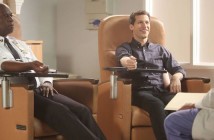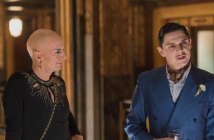March 2, 2014, 9:00 pm (EST), HBO
“After You’ve Gone” is an hour of filler in a season that long seemed lean enough and tight enough to avoid such a thing. It moves the narrative pretty much completely into the show’s present, though it feels the need to track in some unnecessary flashbacks if only to avoid abandoning its structural oddities entirely. It loses a lot of True Detective’s hypnotic power, to the point where even that long final shot didn’t capture me or strike me with the sense of dread it should have. Instead, it was just the end to an episode that felt about as interesting as Marty’s frozen dinner, a low point for the series to date.
Basically, by nature, this episode needed to be pretty much wall-to-wall exposition. Rust and Marty haven’t seen each other in ten years, and we know they both lied to the detectives in their interviews. There are gaps in the narrative we’ve been hearing so far, and “After You’ve Gone” is forced to do some heavy lifting to fill them. That the show’s mystery has never been as enthralling as the men solving it means that in an episode setting up the end game, we spend too much time covering details of the case, and too little mining the internal lives of Marty and Rust.
The episode gives us our first glimpse of the monster that has been haunting the edges of this story since the beginning, and yet all the sense of foreboding that had been built up around the man with the scars, the Yellow Kind in Carcosa, came to little more than a hackneyed reveal of a mustache twirler talking to himself while cutting his spiral symbol into the grass. He didn’t feel like the towering embodiment of evil we’ve been waiting for. He felt less like Buffalo Bill and more like a bad Bond henchman. Now, obviously we just got a brief glimpse of him here, and all of this could be rendered moot by next week’s finale if it sticks the landing. But the button on the episode that could have redeemed it in my eyes instead left me feeling a little cold.
That being said, though, the scene in which Rust shows a former Tuttle maid drawings of the Devil Catchers and she begins proselytizing about Carcosa was pitched exactly right. The whole scene built up to those moments when the veneer of her sanity crumbled and she revealed herself to be another zealot to the cause of Carcosa. It was a deeply unsettling moment, and a reminder of how transfixing the mythology behind this season can be when handled properly.
“After You’ve Gone” is a bit bumpy in its execution, but it also shows us how far Marty and Rust have fallen since 1995, and makes plausible the idea that these two would look at the Dora Lange case as a debt they owe to all of the other nameless victims who have disappeared since they got things wrong all those years ago. These are broken men just trying to eke out one pyrrhic victory in a game they lost long ago. They cannot save the lives that have been lost. They will never be able to cover the cost of their past mistakes. But maybe, just maybe, if they risk everything, they can at least end the waking nightmare that has plagued their world for decades, gnawing at its edges and clawing its way closer and closer to a rotting core. The deeper we get into True Detective the more it resembles a particular kind of noir, one in which our heroes have long since run out of things to lose and want just to complete one final task before they surrender. Rust mentions tonight that he certainly hopes the former maid is wrong about death not being the end. He isn’t looking to become a hero. He’s just looking for an end to his suffering, and to the suffering of countless victims. The deck is stacked against our men. Their very society is constructed to hide bad men and the bad things that they do. The only solution may be to burn it all down. And at this point, it doesn’t look like either Marty or Rust is too eager to be around to see the ashes.
The Roundup
- -“I don’t dwell in the past.” “That must be nice.”
- -“If you were drowning, I’d throw you a fucking barbell.”
- -“He’s lived rough for a long time now.” “He always did, it seemed like.”
- -“After the second home, doubt got taken out behind the woodshed and put down.”
- -“I won’t avert my eyes. Not again.”
- -“You shouldn’t have that.” “Nobody should have this.”
- -“You end up becoming something you never intended. Don’t even really know why.”
- -“Life’s barely long enough to get good at one thing.” “If that long.”
- -“Those days families were bigger.”
- -“Rejoice. Death is not the end.”
- -“Get on out of here. You’re classing the place up.”




